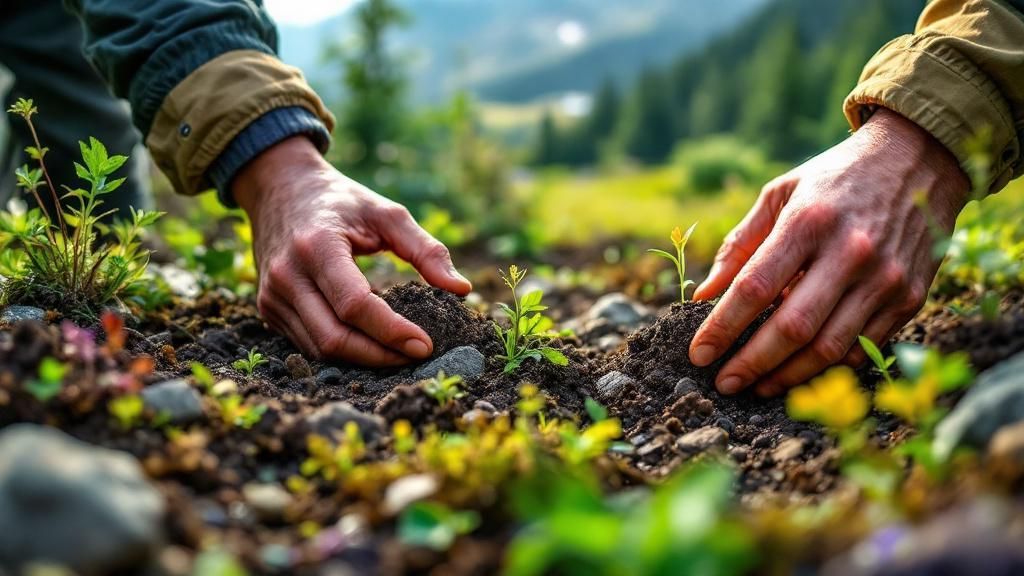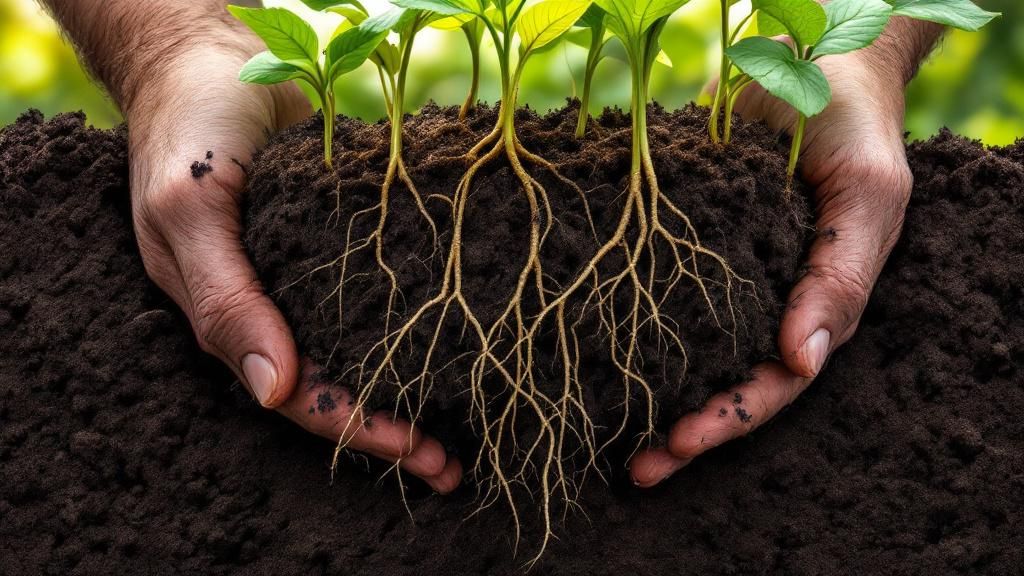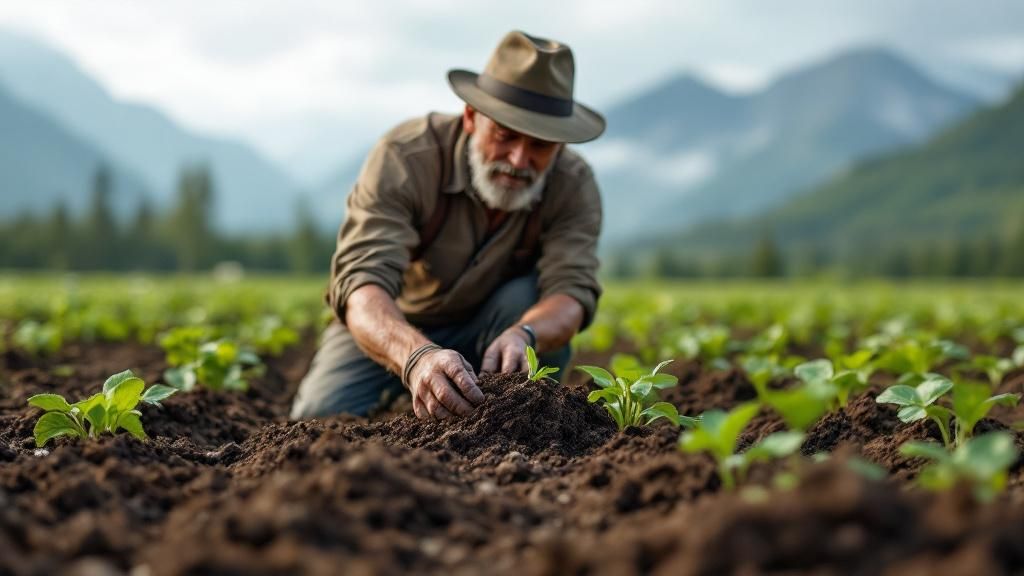
Microorganisms Boost Anchorage Soil Health
-
Soil microorganisms play a critical role in nutrient cycling, plant health, and erosion control in Anchorage.
-
Bacteria, fungi, and other microbes improve soil structure and water retention.
-
Adding organic matter and avoiding chemicals helps boost microbial activity.
-
Anchorage’s unique climate makes understanding and supporting the soil microbiome essential.
-
Healthy microbial activity enhances topsoil quality, supports landscaping, and benefits long-term soil delivery and management practices.
In Anchorage, where harsh winters and variable soil conditions are the norm, maintaining healthy soil is more than just a gardening goal—it’s a necessity. Beneath the surface of thriving gardens, construction sites, and commercial landscapes lies a hidden workforce: microorganisms. These bacteria, fungi, and other microscopic life forms are quietly transforming Anchorage’s soil from the inside out. By improving structure, supporting nutrient cycles, and promoting plant resilience, these organisms are essential to both small-scale gardens and large-scale land projects.
Microorganisms: Anchorage’s Unseen Soil Engineers
Microorganisms decompose organic matter, transforming dead plant material and compost into rich nutrients. This process boosts soil fertility and improves the structure of topsoil—making it more capable of holding water, allowing air flow, and supporting healthy root systems.
In Anchorage, soil conditions can vary widely depending on elevation, moisture levels, and human activity. Introducing or preserving beneficial microbes helps ensure the soil remains productive and resilient. For example:
-
Bacteria and archaea break down organic matter and contribute to nutrient cycling.
-
Fungi, particularly mycorrhizal species, form underground networks that help plants absorb water and nutrients.
-
Protozoa and algae support soil structure and contribute to biodiversity.
When soil microbes are thriving, plant health improves and the landscape becomes more self-sustaining.

How Fungi and Bacteria Shape Anchorage’s Soil Health
Anchorage’s soils often require a little extra support due to freezing temperatures, short growing seasons, and occasional contamination. That’s where microorganisms—especially fungi and bacteria—make a major impact.
-
Fungi, such as mycelium networks, aid in moisture retention, nutrient transfer, and even suppress plant diseases.
-
Nitrogen-fixing bacteria work alongside fungi to convert nitrogen into usable forms for plant growth, especially important in Anchorage’s often nitrogen-poor soils.
-
Biofertilizers made with microbial cultures can improve soil quality and offer a sustainable alternative to chemical fertilizers.
Some local projects are even experimenting with phytoremediation, using plant-microbe systems to detoxify contaminated land—a promising method for regions affected by oil or chemical residues.
Why Soil Microbes Matter for Homeowners and Landscapers
For Anchorage homeowners and property managers, supporting soil microorganisms isn’t just an ecological win—it’s a practical one. Healthy microbial populations:
-
Improve drainage and prevent compaction
-
Boost nutrient availability and reduce fertilizer needs
-
Help bind soil particles to reduce erosion and runoff
-
Promote deeper, healthier root systems
Whether you’re considering topsoil delivery, garden installation, or erosion control strategies, microbial health should be a top priority. Teams like Titan, which offer full-service residential landscaping, hydroseeding, and sitework, understand the importance of soil health and apply science-backed methods to support Anchorage’s unique ground conditions.
Beyond Dirt: Soil as a Living System
One of the most overlooked facts about soil is that it’s alive. A single teaspoon of healthy soil can contain millions of microbes, each playing a role in ecosystem stability. Microbial life helps regulate water retention, control pathogens, and even influence local air quality.
Unfortunately, many conventional practices—such as over-tilling, excessive pesticide use, or compacting heavy machinery—can harm these fragile communities. That’s why more homeowners and commercial property owners are turning to organic matter additions and low-impact soil amendments to protect the biology beneath the surface.
For new lawn or planting installations, Titan’s approach to hydroseed, sod, and tree and shrub planting ensures that introduced vegetation has the microbial support needed to thrive through Anchorage’s challenging seasons.

Soil Research and Innovation in Alaska
Anchorage isn’t behind the curve when it comes to soil science. The University of Alaska Anchorage’s AIMS (Advanced Investigations for Microbiome Studies) facility is leading cutting-edge research on microbe-environment interactions. Directed by Dr. Brandon Briggs, the lab is pioneering ways to study and preserve Alaska’s unique soil microbiome.
With research focused on environmental restoration, phytoremediation, and metal-microbe interactions, local scientists are helping lay the foundation for better land use practices across the state. These insights support smarter landscaping decisions, more resilient urban planning, and informed topsoil distribution strategies across the Anchorage area.
Practical Steps for Anchorage Gardeners and Property Owners
Here are some accessible ways to support healthy microbial life in your soil:
-
Add compost and organic mulch regularly to feed beneficial microbes.
-
Minimize chemical fertilizer and pesticide use, which can destroy microbial populations.
-
Get your soil tested to understand nutrient needs and biological activity.
-
Use cover crops or native plants to support long-term soil health.
-
Aerate soil where compaction is a concern, especially in high-traffic areas.
Service providers like Titan often recommend or include soil amendment strategies as part of a broader landscape, planting, or irrigation plan. Supporting these natural soil builders improves not only your garden—but Anchorage’s environment overall.
FAQs
What do microorganisms do for my soil?
They break down organic matter, release nutrients, improve soil structure, and help plants grow healthier and more resilient.
Can soil microbes help with erosion control?
Yes. Microbes improve soil aggregation and structure, which reduces surface runoff and erosion risk.
Are microbes in Anchorage’s soil different from other places?
Anchorage’s climate and geography support unique microbial populations adapted to colder temperatures and seasonal extremes.
How can I encourage microbial activity in my yard?
Apply compost, avoid chemical pesticides, and limit soil disturbance. Choose organic materials whenever possible.